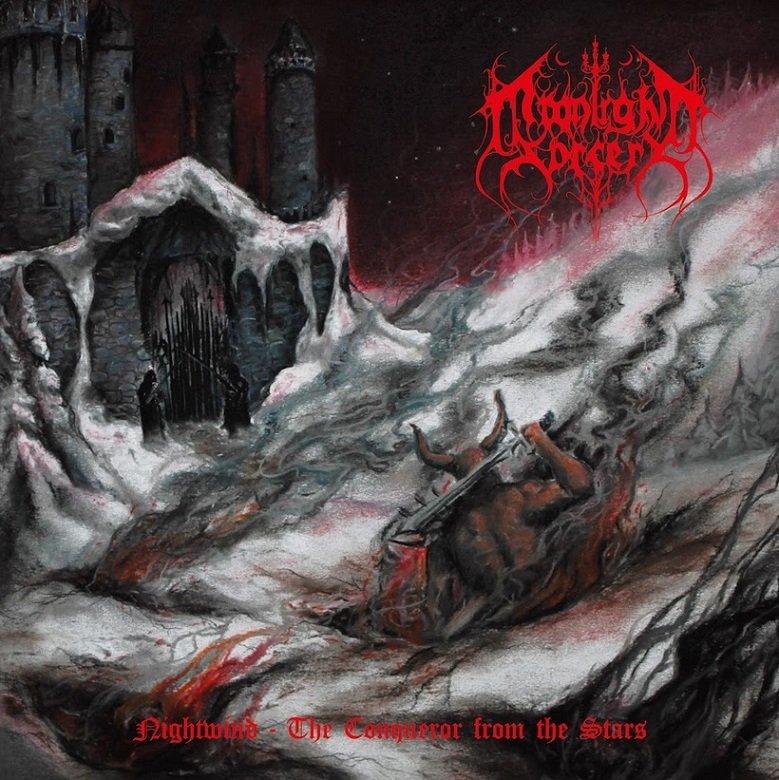Moonlight Sorcery – Nightwind: The Conqueror from the Stars
8/10
I guess their first EP which brought them to the scene caught a lot of ears off-guard and that veil of mystery has been lifted, so it’s not that much of a surprise how good Nightwind is from a songwriting and musicianship point of view.
Moonlight Sorcery hails from Tampere, Finland. They got everyone from Sarah (Banger TV) to bloggers to rave eloquently about their debut EP from last year titled Piercing Through the Frozen Eternity. It is not without any reason that this band has received such acclaim. They play a style of symphonic melodic black metal with neoclassical leanings. An oversimplified genre descriptor would be like Emperor and Yngwie Malmsteen having a baby in the backdrop of the harsh and grim Finnish winter landscape.
Many had enjoyed their first EP and it was surprising that they announced a second EP towards the end of 2022. This followup EP is titled Nightwind: The Conqueror from the Stars, and it has been available digitally since December 2022, while the physical release date was 13 January 2023. Nightwind consists of three original songs and a cover by greek black metal band Agatus.
Nightwind opens with Ancient Sword of Hate, which starts off almost in a nonchalant manner but very soon the melancholic organ parts kick in and this builds into the exceptional guitar work that we associate with the band already. Yötuulten kutsu is the next track which translates to “call of the night winds”. The track opens in a thrash-y manner and the verse-chorus sections are filled to the brim with melody and some of the catchiest riffs you’ll hear on the EP. It evokes a heroic feeling and the upbeat rhythm doubles down on that feeling.
Constellations is the next track. It is an instrumental clocking in over seven minutes long. The Wintersun influence is strong in this intro but that’s where the comparison ends because Moonlight Sorcery makes this track their own. Constellations feels like a journey. The guitar work exudes virtuosity but at the same time it is not sweeps or solos for the sake of it, but each section feels thoughtfully created.
The last track on the EP is a cover of Agatus’s Black Moon’s Blood from their Dawn of Martyrdom album, which was released in 1996. I think Moonlight has taken this track and made it fit perfectly with their style and in this EP. They’ve, quite naturally, infused their symphonic elements and also subtly added bombastic drum sounds, which provides that extra oomph (almost post-punk-y), while still retaining the essence of this old school track. The vocals are more high-pitched and fit it well too. Overall, it was total justice to the original while making it sound very Moonlight Sorcery-like.
The instrumentation and the musicianship on Nightwind is top notch. The rhythm guitars feel very rich and warm. I do not need to mention the exceptional solos and guitar leads, because I feel that I’ve overstated that fact more than a couple of times. The bass is played loud and proud and you can hear it clearly through the album and it does a great job of being the rhythmic skeleton in all songs. I’m not a fan of symphonic black metal, primarily due to the keys but I must say, like their first EP, I am a big fan of how the band uses keys. Just the right mix.
Overall, I think Nightwind is a worthy successor to Piercing, and it is also more, for lack of a better word, straightforward sounding as well. I guess their first EP which brought them to the scene caught a lot of ears off-guard and that veil of mystery has been lifted, so it’s not that much of a surprise how good Nightwind is from a songwriting and musicianship point of view. The challenge for bands aren’t the one-hit wonders but about sustaining their ability to churn out killer music from time to time. In that regard, Moonlight Sorcery has exceeded all expectations and I look forward to what the band does next!
Originally posted on Tempelores.com







